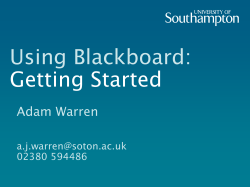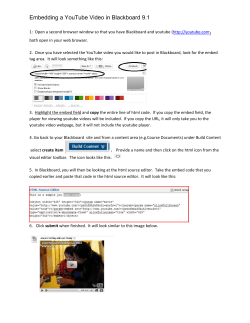
CSIS-112 Windows OS
Welcome to CSIS-112 Windows Operating Systems Ronald Norman, Ph.D., CCP, CSM Office Phone: 619.644.7515 Email: ronald.norman@gcccd.edu My website: www.grossmont.edu/people/ronald-norman Office: Bldg. 54, Room 510A (inside corridor) Revision Date: January 27, 2015 1 About Dr. Norman (your professor) AA, BS, MS, and Ph.D. [University of Arizona] degrees - all related to the computer and software industry Full-time instructor @ Grossmont College, an emeritus (retired) professor @ San Diego State University, and is also an adjunct (parttime) professor @ the University of Maryland (online) and National University in San Diego He has written well over a million lines of software and built hundreds of business applications for dozens of global enterprises over a 40+ year industry career His consulting, mentoring, presenting, and coaching of software engineering clients include Amazon, Federal Express (FedEx), United Parcel Service (UPS), eBay & PayPal, AT&T (wireless), Charles Schwab, Cisco, General Motors, Hewlett-Packard, Chase Bank, and Google Co-author of Unified Software Engineering with Java book, Prentice Hall © 2007 and author of Object-Oriented Systems Analysis and Design book, Prentice Hall © 1996 A Certified Computer Professional (CCP) and a Certified Scrum Master (CSM) 2 Course Description (Catalog) This course introduces the Microsoft Windows family of operating systems (Windows 7 specifically). Coverage begins with the desktop graphical user interface, and ends with the configuration and maintenance of Windows as might be required of a home or a small business user. Topics will include with a focus on the desktop (client) Win 7: hardware and software installation and configuration networking to a LAN and to the Internet security and file sharing administrative tools scripting and batch files maintenance and performance tuning file systems, storage devices, communication devices command line options registry repairs disaster recovery and troubleshooting 3 Course Prerequisite None, but… CSIS-110 is helpful as are any other computer-related courses you may have taken along with your own use of a PC/Mac/laptop/tablet, iPod/iTouch/iPad/MP3, smart phone, video game, or surfboard (just kidding about the surfboard). 4 Student Learning Outcomes At the end of this course, students should be able to: 1. Assess the capability of a computer currently running an older version of the Windows Operating System and, if capable, install or upgrade the latest Windows Operating System on that computer 2. Customize the Windows Operating System’s Graphical User Interface and navigate and experiment with its many features 3. Describe the best practices for the Windows Operating System’s File Management system and create a file management structure that conforms to these best practices 5 My role – a “Facilitator” Your Goal 6 Something For Us All To Think About… “Some people talk in their sleep. Lecturers talk while other people sleep!” - Albert Camus “…or play on their electronic gadgets!” - Ron Norman 7 Course Requirements Students are expected to: attend all class sessions (on-line course sections excluded) participate in all class activities complete quizzes as scheduled (no make-ups) Failure to do the above may result in the loss of points which may lead to the lowering of your letter (A, B, C…) grade in this course 8 Course Meetings 17 weeks including Final Exam day/Time for classroom course sections Lecture and Lab will be held in the same room – 533 Lecture previewing weekly tutorials will usually be first, but not always! For ONLINE course sections there are NO classroom meeting times! (ignore the box above this one!) All of the 5xx “Open Lab” classroom computers have Windows 7 Operating System on them! 9 Course Text & Materials New Perspectives on Microsoft Windows 7 for Power Users (Advanced), ISBN-13 978-1-1115-2649-8 by Harry L. Phillips, Course Technology, © 2012 (optional) USB Flash/Memory Stick to hold all of your work & class material Student Data files. They can be downloaded from my Out box for this course, or the Blackboard container for this course, or directly from the book’s website 10 Course Grading Criteria Course grades are based on the number of points earned from the following list of assessments Type of Assessment Tutorial Quizzes Final Exam (Extra Credit) TOTAL Number of Assessments Total Points Percentage of Grade 14 @ 20 points/each 280 100% 1 @ 25 extra credit points 25 280 100% Academic Integrity will be enforced!!! See Syllabus for details!!! Basically, do your own work!!! 11 Course Grading Grade Percentage Point Scale A 90 - 100% 252 or more B 80 - 89.9% 224 - 251 C 70 - 79.9% 196 – 223 D 60 - 69.9% 168 – 195 F < 60% 0 – 167 Definition of Grades: A: Outstanding achievement that significantly exceeds standards B: Commendable achievement that exceeds standards C: Acceptable achievement that meets standards D: Marginal achievement that is below standards F: Failing I: Incomplete 12 Course Schedule To get an another copy of the Course Syllabus or Course Schedule use one of: 1) www.grossmont.edu/people/ronald-norman (click on the CSIS112 Course Link) 2) My OUT box -> CSIS112 3) The Blackboard container for this course 13 Web Site Links The Textbook’s Website is located @ http://cengage.com Search using the book’s ISBN # (10 or 13 digits) Student Data Files are located on Blackboard for the CSIS112 course Student Data Files are also located in my OUT box for the CSIS112 course “How To” instructions for getting to the instructor IN/OUT box are located on my website @ http://grossmont.edu/ronaldnorman 14 10 Rules of Conduct 1. 2. 3. 4. 5. Learn and Grow Have fun One speaks, all listen Ask questions & offer comments Another Opinion? is OK! (except on an exam) 6. Everyone needs to participate 7. No one dominates (except me!) 8. No internet, eMail, IM, texting, Twitter, games, etc. during lecture time 9. No eating or drinking in the room 10. Electronic devices silent and out of sight at all times Whereas … … heretofore … … set forth … … stipulate … 15 16
© Copyright 2025





















